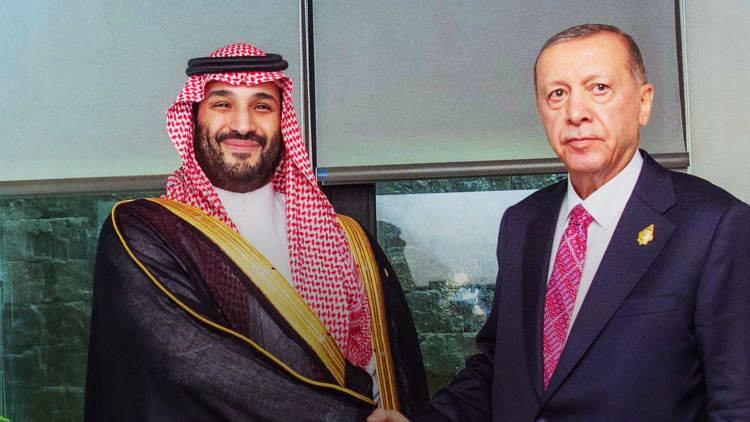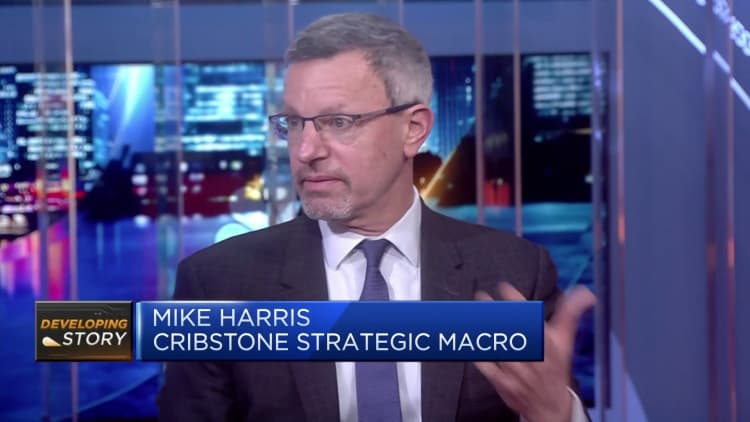Turkey’s Erdogan faces toughest test yet in landmark election — with high stakes for the world
Turkish President and Leader of the Justice and Development (AK) Party, Recep Tayyip Erdogan speaks as he and his wife Emine Erdogan attend an election rally in Mardin, Turkiye on May 10, 2023.
Turkish Presidency | Handout | Anadolu Agency | Getty Images
Turkey is holding both its presidential and parliamentary elections on May 14, and it could scarcely come at a more polarized moment for the country of 85 million.
Just three months after devastating earthquakes there killed more than 50,000 people, the country that boasts NATO’s second-largest military, houses 50 American nuclear warheads, hosts 4 million refugees and has taken up a key role in Russia-Ukraine mediation is staring down an economic crisis years in the making.
Incumbent President Recep Tayyip Erdogan is in the fight for his political life after two decades in power, having served as Turkey’s prime minister from 2003 to 2014 and president from 2014 onward. He came to prominence as mayor of Istanbul in the 1990s, and was celebrated in the first decade of the new millennium for transforming Turkey’s economy into an emerging market powerhouse.
But recent years have been far less rosy for the religiously conservative leader, whose own economic policies have triggered a cost-of-living crisis. Tensions between Turkey and the West frequently spike, and international and domestic voices alike sound the alarm that Turkey’s democracy is looking less democratic by the day.
“Under Erdogan’s leadership, Turkey has provided arguably the most vivid template of how a state with plausible, functioning institutions and relatively effective rule of law can be subsumed under the will of first a ruling party and ultimately a single individual,” Hussein Ibish, a senior resident scholar at the Arab Gulf States Institute in Washington, told CNBC.
‘A moment of high anxiety’
The frequent arrests of journalists, forced closures of many independent media outlets and heavy crackdowns on past protest movements — as well as a 2017 constitutional referendum that vastly expanded Erdogan’s presidential powers — signal what many say is a slide toward autocracy.
Now, given a recent downturn in support for Erdogan, some fear he may play dirty to ensure his hold on power. His top competition is opposition leader Kemal Kilicdaroglu, leader of the center-left Republican People’s Party (CHP), who is running as a unity candidate representing six different parties that all want to see Erdogan out of power.

“This is definitely going to be the closest electoral contest Erdogan has faced since taking power in 2002,” said Ryan Bohl, a senior Middle East and North Africa analyst at Rane.
There is also anger at the government for its slow response to a series of devastating earthquakes in February that killed more than 50,000 people in both Turkey and Syria, especially concerning corrupt practices that allowed construction firms to skirt building safety regulations. But the vast majority of Turks in the affected areas are longtime supporters of Erdogan’s party, the AKP, and seem to have faith in Erdogan’s pledge to have those cities rebuilt within a year, analysts say.
The stakes are high for the entire country and, more broadly, global geopolitics – and the mood on the ground is tense. Opinion polls are very close with most currently showing Kilicdaroglu ahead, but not by much. Many are asking: if Erdogan loses, will he actually leave?
Turkish President Recep Tayyip Erdogan speaks to press after 7.7 and 7.6 magnitude earthquakes hit southern provinces of Turkey, on February 07, 2023 in Ankara, Turkey.
Mustafa Kamaci | Anadolu Agency | Getty Images
“I’m very concerned that [Erdogan] may deploy underhanded tactics, cheating and even violence,” Ibish said. “Of course, that can provoke extreme measures from the other side. So it’s a moment of high anxiety.”
CNBC has reached out to the Turkish Presidency’s office for comment.
The presidential election has two rounds. If no candidate wins more than 50% of the vote in the first round — which is widely expected to be the case — the vote goes to a runoff that will be held two weeks later.
Turkey’s economy: In for a reckoning
Turkey’s economy has been in a downward spiral for the past five years, in which time its currency, the lira, lost 77% of its value against the dollar, inflation has ballooned and unemployment has largely worsened. Turkey’s official inflation rate is more than 50%, though economists say in reality it’s higher than 100%.
“The economy is top of the minds for ordinary Turks and is the driving force behind the weakening support for the government,” Rane’s Bohl said. “If Erdogan and the AKP do lose power, it’ll be almost entirely on economic grounds.”
Erdogan has largely refused to raise interest rates despite ballooning inflation, insisting against all economic orthodoxy that hiking rates worsens inflation, rather than the other way around. This along with expensive central bank interventions propping up the lira, which have led to shrinking foreign currency reserves, sent Turkey’s foreign investors running for the hills over the last few years.
The current monetary tools Erdogan’s administration has been using to give the economy a semblance of stability are unsustainable, economists warn, and after the election will have to stop — likely leading to severe volatility.

“The currency has to collapse if he [Erdogan] wins, because there will be no confidence and he’s created this artificial scenario that can’t be sustained for a prolonged period of time,” Mike Harris, founder of Cribstone Strategic Macro, boldly predicted in February.
If the election goes smoothly, “I think we see an uptick in investment into Turkey,” George Dyson, a senior analyst at Control Risks said, adding: “This will be particularly true if the opposition wins — it will show off Turkey’s democratic credentials and ease concerns around the rule of law.”
But a number of challenges loom ahead: a potential fracturing of the opposition alliance, if they win, could “create negative momentum around the economy,” Dyson warned. And worse, if the election result is contested by the loser, with claims of electoral fraud, confidence in the economy will worsen dramatically, he predicted.
View over the tourist area of Istanbul, Turkey, on october 27, 2022.
Rita Franca | Nurphoto | Getty Images
Kilicdaroglu and his opposition coalition propose a very different economic path forward if they win.
“Importantly for investors, the opposition wants to return to an orthodox monetary system vs. the incumbent administration’s heterodox policymaking,” Goldman Sachs analysts wrote in a research note Thursday.
Still, in either case “one should not expect miracles overnight as efforts to tame inflation with higher rates would likely cause currency shocks in the near-term,” warned Hakan Akbas, managing director of consulting firm Strategic Advisory Services, based between Istanbul and Washington. “However,” he added, “a new political leadership with a credible, competent economy team will have more support and patience from investors.”
What next for NATO and Ukraine relations?
Despite Turkey being a longtime member of NATO, a trademark of Erdogan’s has been to spar with his Western counterparts, criticize them at home and strengthen ties with Russia. His frequent anti-Western rhetoric and ongoing pushback against Sweden’s bid to join NATO have amplified tensions with European and American leaders — something Kilicdaroglu pledges to reverse.
“Turkey is a member of the Western alliance and NATO and Putin also knows this well,” Kilicdaroglu told the Wall Street Journal in an interview this week. “Turkey must comply with decisions taken by NATO.”
Kilicdaroglu also “wants to prioritize close economic relations with Europe in particular, while the incumbent administration’s current non-aligned policy stance would likely continue,” Goldman Sachs analysts wrote in their note.
Turkish President Recep Tayyip Erdogan (L) meets President of Russia, Vladimir Putin (R) within the 22nd meeting of the Shanghai Cooperation Organization (SCO) leaders’ summit in Samarkand, Uzbekistan on September 16, 2022.
Anadolu Agency | Anadolu Agency | Getty Images
Still, Turkey’s spearheading of negotiations for the U.N.-brokered Black Sea grain deal, which has helped ensure vital Ukrainian food exports reach countries that need them, is likely to continue regardless of who takes power. Country analysts also believe that if Erdogan wins, he will ultimately acquiesce to Sweden’s NATO membership, and will continue to try to mediate between Ukraine and Russia.
But the power of nationalism and Erdogan’s popularity in Turkey means that “even if he loses, his national presence and policy influence will not have vanished,” Ibish said.
“If Erdogan wins, of course, we can expect more of the same: a continuation on uneasy terms of the Turkish membership in NATO and relations with European and other Western states. But it’s not going to be pretty.”
For all the latest World News Click Here
For the latest news and updates, follow us on Google News.

